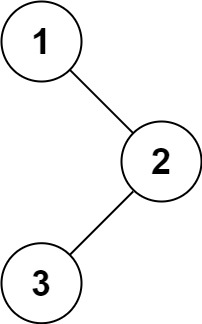Given the root of a binary tree, return the inorder traversal of its nodes' values.
Example 1:
Input: root = [1,null,2,3] Output: [1,3,2]
Example 2:
Input: root = [] Output: []
Example 3:
Input: root = [1] Output: [1]
Constraints:
- The number of nodes in the tree is in the range
[0, 100]. -100 <= Node.val <= 100
Follow up: Recursive solution is trivial, could you do it iteratively?
Companies: Adobe, Amazon, Facebook
Related Topics:
Stack, Tree, Depth-First Search, Binary Tree
Similar Questions:
- Validate Binary Search Tree (Medium)
- Binary Tree Preorder Traversal (Easy)
- Binary Tree Postorder Traversal (Easy)
- Binary Search Tree Iterator (Medium)
- Kth Smallest Element in a BST (Medium)
- Closest Binary Search Tree Value II (Hard)
- Inorder Successor in BST (Medium)
- Convert Binary Search Tree to Sorted Doubly Linked List (Medium)
- Minimum Distance Between BST Nodes (Easy)
// OJ: https://leetcode.com/problems/binary-tree-inorder-traversal/
// Author: github.com/lzl124631x
// Time: O(N)
// Space: O(H)
class Solution {
private:
vector<int> ans;
void dfs(TreeNode* root) {
if (!root) return;
dfs(root->left);
ans.push_back(root->val);
dfs(root->right);
}
public:
vector<int> inorderTraversal(TreeNode* root) {
dfs(root);
return ans;
}
};// OJ: https://leetcode.com/problems/binary-tree-inorder-traversal/
// Author: github.com/lzl124631x
// Time: O(N)
// Space: O(H)
class Solution {
public:
vector<int> inorderTraversal(TreeNode* root) {
vector<int> ans;
stack<TreeNode*> s;
while (root || s.size()) {
while (root) {
s.push(root);
root = root->left;
}
root = s.top();
s.pop();
ans.push_back(root->val);
root = root->right;
}
return ans;
}
};